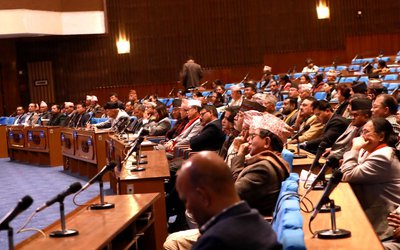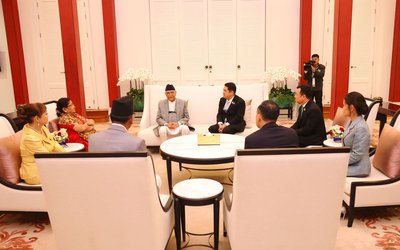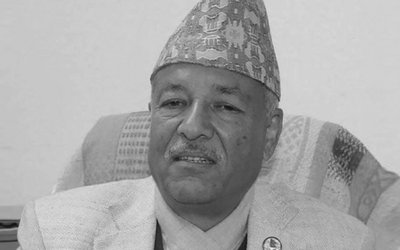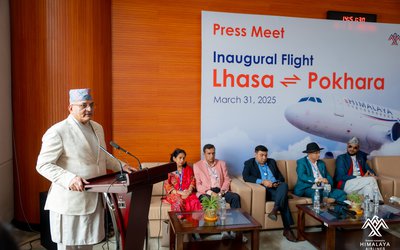
What is the present state of the Social Welfare Council?
The present state of the council is terrible as it is working as it was 35 years ago. There is still the same system, almost same employees and same mentality. What I have been doing in the last one year is to change the system and to make it into an institution based on the rule of law. There is still a lot of backlog. We are also working to make a new system in INGOs and NGOs sector. We are also working to reform and modify the process in NGOs and INGOs sector. My aim is to make the working process of council more systematized. From problems of employees to program approval system, I have already made certain reforms.
How many NGOs are NGOs are there?
There are 37,400 NGOs and 175 INGOs affiliated to SWC. Out of this, there may be ten percent NGOs actively working. If we look at the whole NGOs, all over Nepal, there may be over 45,000 NGOs. It is very challenging to manage the NGOs.
It is reported that INGOs and NGOs have been violating the rules. How do you look at this?
We have already initiated actions against 37 INGOs which were not working as per the direction of the government of Nepal and Social Welfare Council. This is the first time the Council is initiating actions against those INGOs. We are also working to initiate actions against those NGOs which are not following the laws and regulations. There are certain lapses in the laws.
What are the lapses in laws?
The laws do not mention anything about the basis of actions. There is no reward and punishment provision in the act. We are also working to amend the act.
It is reported that a lot of money is also distributed through other mechanisms. What plans do you have to change the situation?
We have reports that a lot of money is now distributed through bilateral and multilateral system through Ministry of Finance. We are demanding implementation of a one-door system so that people may know how much money is spent through INGOs and NGOs. Nobody knows how much is spent through INGOs and NGOs in the social sector.
What about the NGOs and INGOs registered with SWC?
All the INGOs, which are registered with SWC, submit their annual programs to us. Of course, NGOs are violating this. I have already issued warnings to those NGOs which do not submit their programs. I will take action if they do not abide by the orders of SWC. We are developing a data system integrating NGOs and INGOs, projects and programs.
It is often said that there is no coordination among various institutions. What do you say?
It is true that there is no coordination among various agencies. There is no coordination between the Ministry of Women, Children and Social Welfare and Social Welfare Council and there is even lack of coordination among various divisions in the Council. Our coordinating part is very weak. The situation is now that we approve every project presented by the INGOs without coordination with others.
It is reported that INGOs and NGOs are not transparent regarding their programs and projects. What do you say?
Our system is very transparent. We have placed all the information regarding the INGOs and status of their programs as well as progress in a system. They annually submit their progress reports to us. However, some media cover news without visiting our website. All INGOs have to submit their financial reports yearly and hold the meetings twice a year with us. Along with presenting their annual reports and annual expenditure, INGOs also need to make social audit. We are very transparent in terms of INGOs functioning. Even you can see this in our website as to how much budget is sent to VDCs by INGOs.
How much money do INGOs spend in Nepal?
Last year, we approved the annual programs and projects worth about Rs. 6.5 billion of INGOs and over Rs.8 billion projects of NGOs. Along funds from INGOs, NGOs also receive direct budget from third countries. My last one year’s experience shows that more cash flow is made through NGOs than INGOs. There is the need of transparency not only for INGOs but also for NGOs. SWC has already directed NGOs to bring the programs making balance on soft ware and hard ware. Some NGOs have shown interest in our programs.
How do you justify the present trend to evaluate the projects of INGOs through their budget?
Nobody can justify this. This is the reason we are demanding additional budget from the government for the evaluation team. Of course, as a regulatory authority, the Council has to monitor the projects and programs run by INGOs. Due to lack of budget in the council, we are now evaluating the programs of INGOs through their budget.
Do you charge certain amount with INGOs?
Social Welfare Council does not charge any money with INGOs. In other countries like in Bangladesh, INGOs have to pay certain amount as entry fee. Social Welfare Council is providing free service to INGOs. We are working to make certain arrangements to take service charge from INGOs. The decision has not been taken yet.
What are your three immediate priorities?
My first priority is to restructure the SWC. Second priority is to formulate guidelines, directives other such mechanisms to regulate INGOs and NGOs. Although we are not in a position to amend the act, we can make our system more efficient through directives and regulations. I have already started OM study. I am making all our work on certain database. We will provide services to all INGOs and NGOs through our database. We are also establishing regional offices in five development regions. We don't have any directives for monitoring. I will make it. My next priority is to set standardization for foreign country representatives working in Nepal.
What do you mean by standardization?
Standardization means to set certain level for foreigners coming to work in Nepal as a country representative. We will make certain arrangements for standardization. We will allow foreigner as a country representative if concerned INGOs do not find Nepalese citizen with required standard. The council will encourage more Nepalese as country representatives in INGOs.
Don't you think standardization criteria are against the autonomy of INGOs who collect donations for the development of Nepal?
I am not saying that I will not allow foreigners to lead INGOs. What I mean is if Nepali citizens can fulfill the criteria, why not encourage the Nepali citizens.
What is the overall budget?
There is a history. For the last 25 years, SWC has been receiving similar amounts of budget annually. Government has been providing 18 million rupees to us. This budget was allocated when SWC monitored just 200 NGOs. This year the government agreed to provide 19 million rupees. We have our own resources generated from Exhibition Ground, Vegetables Market and some land in Baneshwor. Our annual budget is 70 million rupees. We are proposing the budget for 90 million rupees. Out of the budget, over 45 million goes to salary of the employees. The council is generating the resources on its own.
What about your one window policy?
Many INGOs and NGOs are working in Nepal with various international agencies signing the agreement with Council and some are even working by signing the agreement with government agencies. This has created a lot of confusion. Instead of present multiple windows, we are stressing one window policy. Various government institutions have been working haphazardly. We need to have one door policy to keep tab of the contribution.
- IME GROUP: Expands Into Paper Industry
- Mar 24, 2025
- CPN UML: Instigated By India
- Mar 23, 2025
- ADB’S CHIEF ECONOMIST: Nepal Reduces Poverty
- Mar 11, 2025
- FM DR. DEUBA: A Successful Visit
- Mar 11, 2025
- MD GHISING: Target Of Personal Grudge
- Mar 09, 2025















